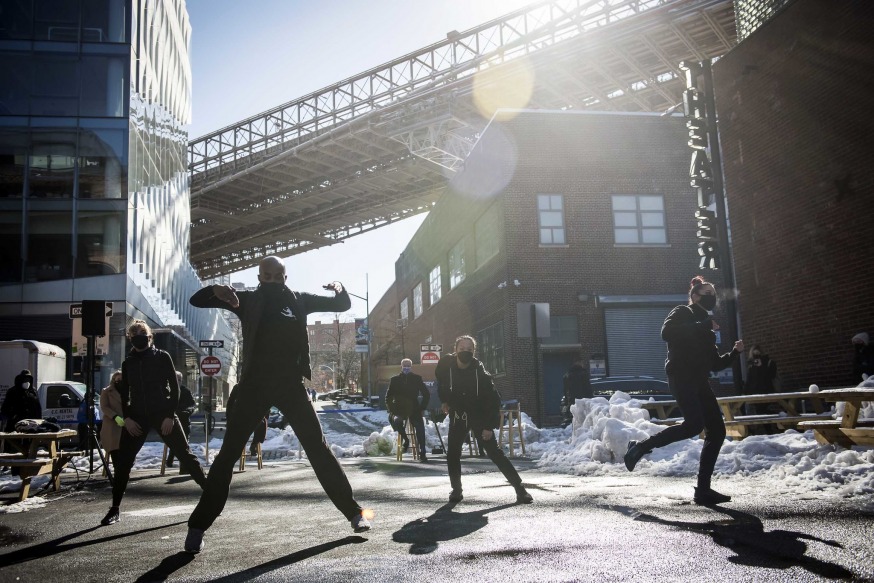
A February Open Culture performance in Brooklyn (Ed Reed/Mayoral Photography Office)
Sept. 14, 2021 By Allie Griffin
Council Member Jimmy Van Bramer wants to make a pandemic-era program that allows performers to host ticketed events on city streets a permanent fixture in the city.
Van Bramer introduced a bill last week to make the temporary “Open Culture” permit program permanent and year-round. The Council’s Committee on Cultural Affairs, Libraries, and International Intergroup Relations will be hearing the bill today.
The council member first introduced the program — modeled after the city’s “Open Restaurants” outdoor dining plan — last year when traditional performance venues were forced to close their doors due to the pandemic.
The program — which allows eligible artists to perform ticketed concerts, plays, comedy and other events on city streets and at various public spaces — began in March and is set to expire at the end of next month.
Van Bramer’s bill would extend the program to be year-round and permanent.
The bill also aims to increase the number of streets and outdoor venues where artists are permitted to hold events. The program, in its current form, has a finite list of streets and public spaces—as determined by the Department of Transportation (DOT)–where artists are allowed to perform.
“By making the Open Culture program a permanent fixture in New York City, we will not only provide an additional lifeline for our artists, performers and vital cultural organizations, it will also create an exciting new norm for diverse performances throughout the city,” Van Bramer said.
The legislation would also create a new annual reporting requirement to evaluate the benefits and challenges of the Open Culture program.
The program, Van Bramer said, has become a vital tool for cultural institutions, performance venues, and artists to share their work with the public and earn revenue. About 220 permits have been granted to artists and arts organizations since the program’s inception.
Artists who perform on streets are able to charge patrons for tickets to watch their acts.
“The Open Culture Program has been a much-needed lifeline, not just for the smallest performing arts organizations and the independent artists of this city, but for the communities they serve who find a safe respite, an opportunity for joy and a space for connection through the live arts of the Open Culture Program,” Aimee Todoroff, Managing Director, The League of Independent Theater said.
“It is imperative that the Open Culture Program is made permanent, is expanded, and is supported by robust city funding and outreach.”
6 Comments

That’s a good idea.
Thank you Council Member Jimmy Van Bramer. We love you. Please run for the 37th Assembly District in Queens County.
Is going to be about bike lanes and drag queen story hours.
How is it this comment is still posted? What? You don’t like LGBTQ? Needed a story about culture to take potshots at bike lanes and a different community than you?
Jimmy Van Bramer worked hard to bring both of those to Sunnyside and to nyc. Nothing wrong to me with his comment. That is what he is known for around here. Stop making things negative. Check yourself and your own prejudices.
That’s all he’s done. That’s all he’s apparently good for.
Meanwhile, drag Queens aren’t necessarily gay, so check YOUR ignorance!!!